Your cart is currently empty!
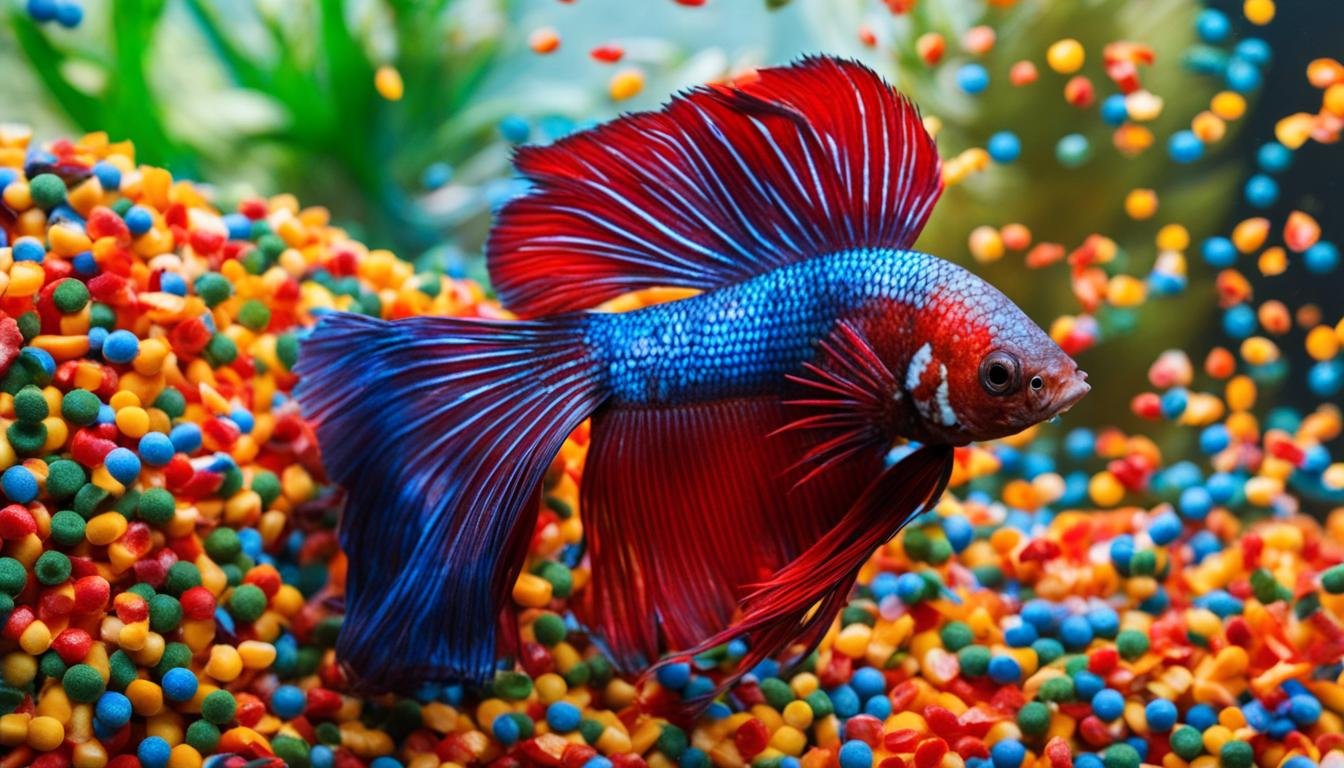
Can Bettas Eat Tropical Fish Food? Discover the Answer!
Are you wondering if it’s safe to feed your bettas tropical fish food? We’re here to provide you with all the answers you need about their diet. Bettas are beautiful and vibrant fish that require specific nutrition to thrive, so it’s crucial to choose suitable food for them. Let’s dive into the world of betta fish diet!
Key Takeaways:
- Bettas can consume tropical fish food, but it’s vital to opt for high-quality, protein-based options.
- Choose flakes specifically formulated for bettas, such as Fluval Bug Bites Betta Formula Flakes or Nutrafin Max Betta Color Flakes.
- Bettas are carnivorous by nature, so their diet should consist of at least 30% protein.
- Offer a diverse diet to meet their nutritional needs and keep them healthy.
- Tropical fish flakes can be beneficial as part of a balanced diet, but remember to provide other food alternatives like pellets, live food, and frozen or freeze-dried options.
Understanding Betta Fish Dietary Requirements
When it comes to feeding your betta fish, it’s important to understand their dietary requirements to ensure their health and happiness. In their natural habitat, bettas are carnivores, primarily feeding on insects, mosquito larvae, and worms. As such, their diet should consist of foods that are high in protein and low in fat. This helps prevent obesity and keeps them in optimal condition.
To meet their nutritional needs, it’s crucial to provide a varied diet that includes a mix of protein-based foods. This can include high-quality tropical fish flakes specifically formulated for bettas, as well as other options such as pellets, live food, and frozen or freeze-dried foods. Offering a diverse range of food not only provides essential nutrients but also keeps your betta fish mentally stimulated.
The Key Nutritional Requirements for Bettas:
- At least 30% protein content
- Low fat content to prevent obesity
- Essential vitamins and minerals
By understanding and meeting these dietary requirements, you can ensure that your betta fish thrive in their tank environment. Providing the right food will not only keep them healthy but also enhance their vibrant colors and overall appearance.
The Benefits of Tropical Fish Flakes for Bettas
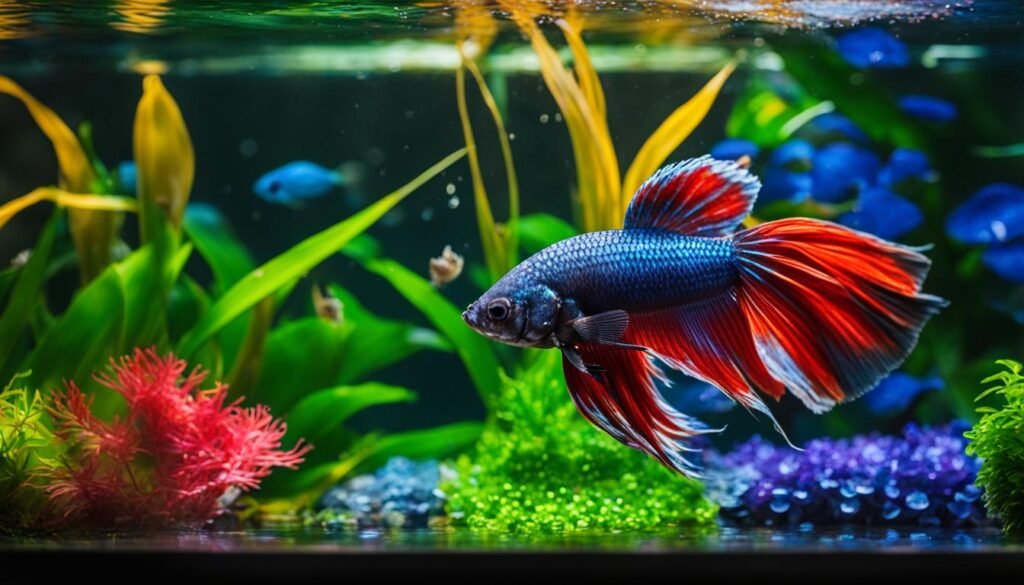
When it comes to feeding our beloved bettas, it’s important to provide them with a balanced diet that meets their nutritional needs. One option that can be beneficial for bettas is tropical fish flakes. These flakes offer a range of advantages that contribute to the overall health and well-being of our finned friends.
Why choose tropical fish flakes?
Tropical fish flakes are a convenient and easy-to-use option for feeding bettas. They are readily available in pet stores and can be stored easily. The flakes are specifically formulated to provide a good source of protein, which is essential for the growth and development of our bettas. Protein is crucial for maintaining muscle strength and promoting vibrant colors in their fins.
Add variety to your betta’s diet
While tropical fish flakes can be a staple in your betta’s diet, it’s important to offer a variety of foods to ensure their nutritional needs are met. Consider supplementing their diet with other options such as pellets, live food, or frozen and freeze-dried foods. This variety not only provides additional nutrients but also stimulates their natural hunting instincts and prevents boredom.
- Pellets: Choose high-quality pellets specifically formulated for bettas. Look for brands that offer a balanced mix of protein, fats, and essential vitamins and minerals.
- Live food: Offer your bettas live food like brine shrimp or bloodworms. These options closely mimic their natural diet and provide important nutrients.
- Frozen and freeze-dried foods: These options are convenient alternatives to live food and still offer a good source of nutrition. Look for frozen or freeze-dried options like daphnia or mysis shrimp.
By incorporating a variety of foods into your betta’s diet, you can ensure they receive all the necessary nutrients for optimal health and vitality.
Choosing High-Quality Tropical Fish Flakes for Bettas
When it comes to feeding your bettas, it’s crucial to choose high-quality tropical fish flakes that meet their nutritional needs. Not all flakes are created equal, and it’s important to select ones that are specifically formulated for bettas. These flakes should have a high crude protein content and be free from plant-based ingredients that do not meet the carnivorous nature of bettas.
To ensure you are providing suitable flakes for your bettas, look for trusted brands that specialize in betta fish nutrition. Fluval Bug Bites Betta Formula Flakes and TetraColor PLUS Tropical Flakes with Color Enhancing are two brands that are known for their high-quality formulations. These flakes are designed to provide bettas with the necessary protein and essential nutrients for optimal health and vibrant colors.
When selecting high-quality tropical fish flakes, it’s also important to consider the manufacturing process. Look for flakes that are made with minimal processing to preserve the nutritional value of the ingredients. Avoid flakes that contain artificial colors, flavors, or preservatives, as these additives may be harmful to your bettas.
Key Points:
- Choose flakes specifically formulated for bettas with a high crude protein content.
- Avoid flakes that contain plant-based ingredients.
- Look for trusted brands that specialize in betta fish nutrition, such as Fluval and TetraColor.
- Consider the manufacturing process and avoid flakes with artificial additives.
By selecting high-quality tropical fish flakes for your bettas, you can ensure that they receive the necessary nutrition for their overall well-being. Remember to always read the product labels and consult with a knowledgeable fish expert if you have any doubts about the suitability of a particular brand or product.
Alternatives to Tropical Fish Flakes for Bettas
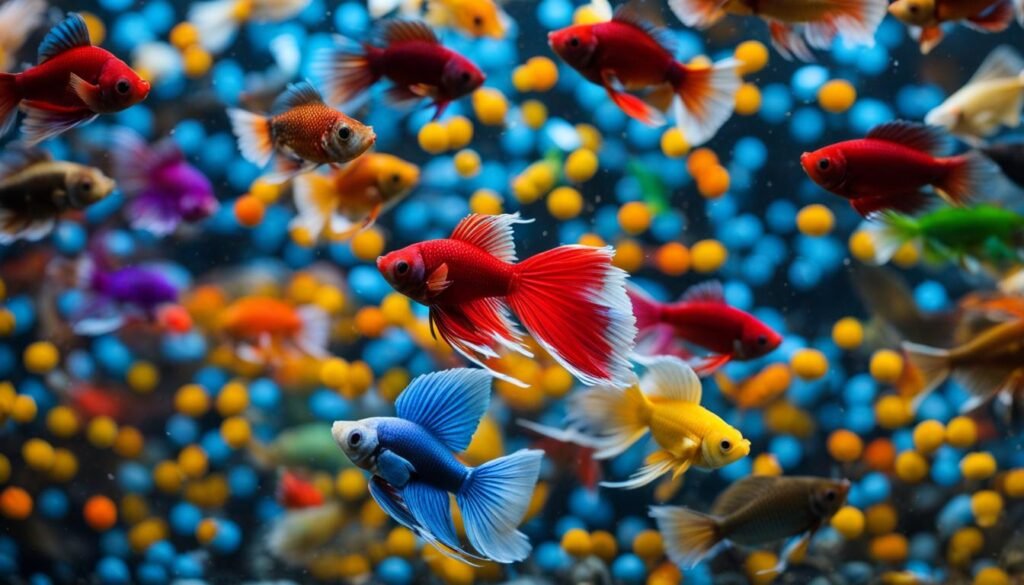
While tropical fish flakes can be a staple in a betta’s diet, it’s important to offer alternatives to provide a varied and nutritious feeding experience. Here are some alternative food options that you can consider for your bettas:
- Pellets: Pellets are a popular choice among betta owners and provide a balanced and complete diet for your fish. Look for pellets specifically formulated for bettas, ensuring they have a high protein content and are fortified with essential nutrients.
- Live food: Offering live food to your bettas can stimulate their natural hunting instincts and provide them with a diverse range of nutrients. Brine shrimp and bloodworms are excellent options that bettas enjoy. You can find them at your local pet store or even consider cultivating them yourself.
- Frozen and freeze-dried foods: These options provide the convenience of long shelf life while still offering the nutritional benefits of live food. Frozen brine shrimp, daphnia, and freeze-dried bloodworms are readily available and can be a great addition to your betta’s diet.
Remember to introduce new foods gradually and observe your bettas’ response to ensure they accept and enjoy the alternatives. Offering a varied diet not only keeps your bettas healthy but also adds excitement to their feeding routine.
Feeding Tips for Bettas
- Rotate between different food options to provide a balanced and diverse diet.
- Feed your bettas small portions multiple times a day rather than one large meal to prevent overeating and promote better digestion.
- Remove any uneaten food after feeding to maintain water quality and prevent contamination.
- Consider using a feeding ring or target feeding to minimize mess and ensure all food is consumed.
By offering your bettas a variety of food choices, you can provide them with optimal nutrition and enhance their overall health and well-being.
Feeding Your Betta Fish with Tropical Flakes
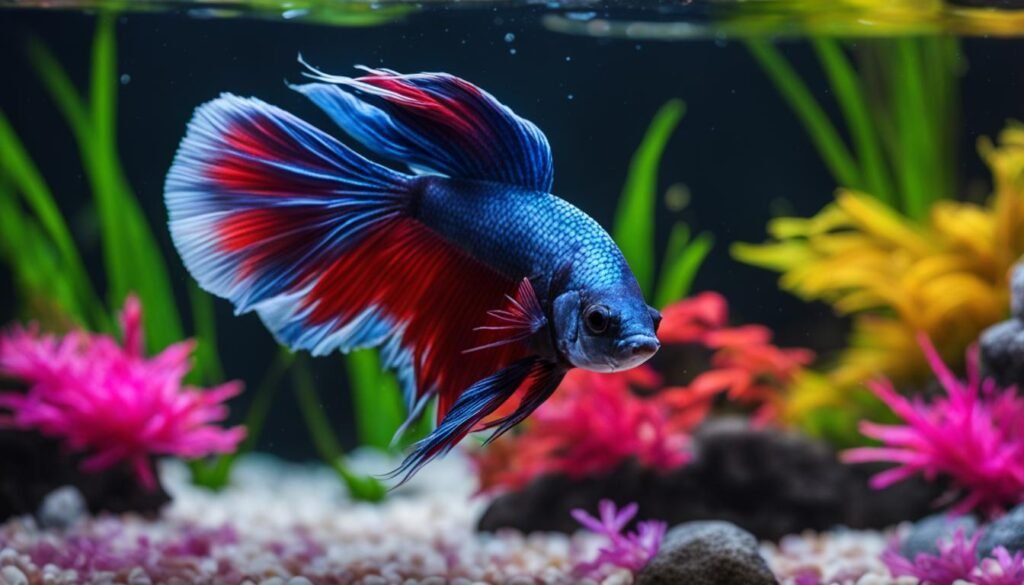
Feeding your betta fish with tropical flakes is a convenient and popular choice for betta owners. These flakes provide a good source of protein and essential nutrients to keep your bettas healthy and thriving. Here are some tips on how to best feed your bettas with tropical flakes.
Daily Feeding Schedule
- Feed your bettas twice a day, offering them a portion that they can consume within two minutes. This helps prevent overfeeding and ensures that your bettas are getting the right amount of nutrition.
- Observe your bettas’ appetite and adjust the portion size accordingly. If your bettas are consistently finishing their food quickly or begging for more, you may need to increase the portion size slightly.
- Remove any leftover flakes after feeding. Uneaten food can quickly contaminate the water and lead to poor water quality, which can be harmful to your bettas’ health.
Enhancing Nutritional Variety
While tropical flakes can be a staple in a betta’s diet, it’s important to provide a varied diet to ensure they receive all the necessary nutrients. Consider incorporating other foods such as pellets, live food, and freeze-dried options.
- Pellets: Pellets are a great alternative to flakes and offer a similar nutritional profile. Look for high-quality betta pellets that are specifically formulated to meet their dietary needs.
- Live Food: Betta fish naturally enjoy hunting live prey. Offer them occasional treats such as brine shrimp or bloodworms to stimulate their natural instincts and provide a diverse diet.
- Freeze-Dried Foods: Freeze-dried options like daphnia or tubifex worms can be a convenient way to provide variety in your betta’s diet. These foods retain much of their nutritional value and are easy to store and feed.
By offering a balanced and varied diet, you can ensure that your bettas receive all the necessary nutrients for optimal health and well-being.
The Importance of a Varied Diet for Bettas
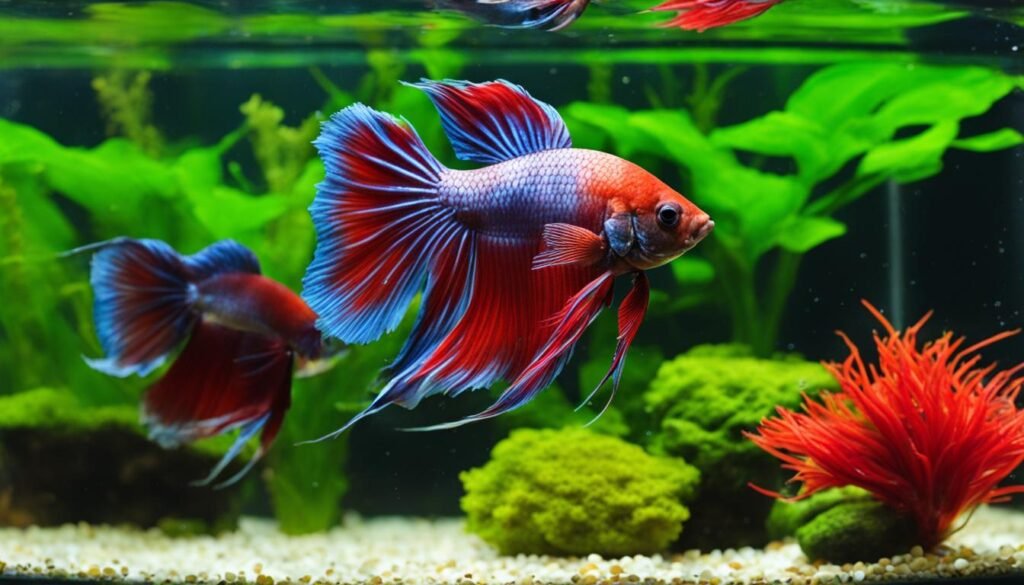
A balanced diet is crucial for the overall health and well-being of betta fish. While tropical fish flakes can be a staple in their diet, it’s important to provide a variety of foods to ensure they receive all the necessary nutrients. By offering different types of food, you can mimic their natural diet and keep them happy and healthy.
One way to provide variety is by incorporating pellets into their diet. Pellets are formulated to meet the nutritional needs of bettas and come in different sizes and formulas. They offer a convenient and practical alternative to flakes, and many bettas enjoy the texture and taste of pellets.
Additionally, live food can stimulate their natural hunting instincts and provide essential nutrients. Brine shrimp and bloodworms are popular options that bettas find irresistible. These live foods are highly nutritious and contain high protein levels, which are important for bettas’ growth and vitality.
Frozen and freeze-dried foods are also excellent alternatives to live food. These options are convenient to store and offer a long shelf life. Frozen foods such as daphnia and mysis shrimp can be thawed and then fed to your bettas. Freeze-dried options like tubifex worms or krill provide a crunchy texture that bettas enjoy.
By offering a varied diet, you can prevent your bettas from becoming bored or disinterested in their food. It also ensures they receive a wider range of essential nutrients that may be lacking in a single type of food. Remember to adjust the portion sizes accordingly and observe your bettas’ appetite to maintain their optimal health.
Conclusion
In conclusion, providing a suitable diet is crucial for the health and well-being of betta fish. When it comes to their diet, bettas can eat tropical fish food, but it’s important to choose high-quality options specifically formulated for bettas. These options, such as Fluval Bug Bites Betta Formula Flakes or Nutrafin Max Betta Color Flakes, should have a high crude protein content and be fortified with essential vitamins and minerals.
However, it’s important to remember that tropical fish flakes should not be the sole source of nutrition for bettas. A varied diet is essential to meet their nutritional needs. In addition to flakes, consider offering alternatives such as pellets, live food like brine shrimp or bloodworms, and frozen or freeze-dried foods. Providing this variety not only provides a wider range of nutrients but also helps prevent boredom and stimulates their natural instincts.
When feeding your bettas, it’s important to observe their appetite and adjust the portion size accordingly. Feed them tropical flakes twice a day, offering a portion that they can consume within two minutes. Avoid overfeeding to prevent waste and water contamination. Remember to clean up any leftover flakes to maintain water quality.
By providing a balanced and diverse diet, you can ensure that your bettas receive the proper nutrition they need to stay healthy and happy. So, let’s prioritize their diet and make sure we provide them with a variety of high-quality foods that meet their specific dietary requirements!
FAQ
Can bettas eat tropical fish food?
Yes, bettas can eat tropical fish food, but it’s important to choose a high-quality, protein-based option specifically formulated for bettas.
What kind of tropical fish flakes are recommended for bettas?
Recommended tropical fish flakes for bettas include Fluval Bug Bites Betta Formula Flakes and Nutrafin Max Betta Color Flakes, which have a high crude protein content and are fortified with essential vitamins and minerals.
Why is it important to provide a varied diet for bettas?
Offering a varied diet ensures that bettas receive all the necessary nutrients and prevents boredom. It also stimulates their natural hunting instincts.
Can bettas eat other foods besides tropical fish flakes?
Yes, bettas can also eat pellets, live food such as brine shrimp or bloodworms, and frozen or freeze-dried foods as alternatives to tropical fish flakes.
How often should I feed my bettas tropical flakes?
Feed your bettas tropical flakes twice a day, offering them a portion that they can consume within two minutes.
How do I choose high-quality tropical fish flakes for bettas?
Look for flakes specifically formulated for bettas with a high crude protein content. Avoid flakes with plant-based ingredients and opt for meat-based options.
Why is a varied diet important for bettas?
A varied diet ensures that bettas receive a wide range of nutrients, keeping them healthy and thriving.
Leave a Reply